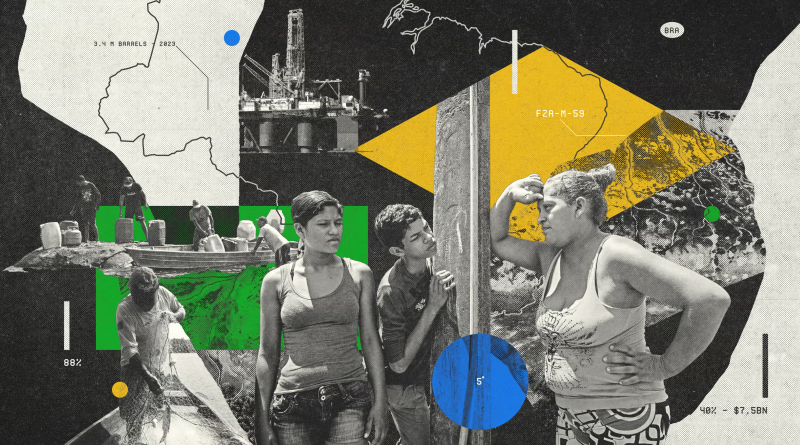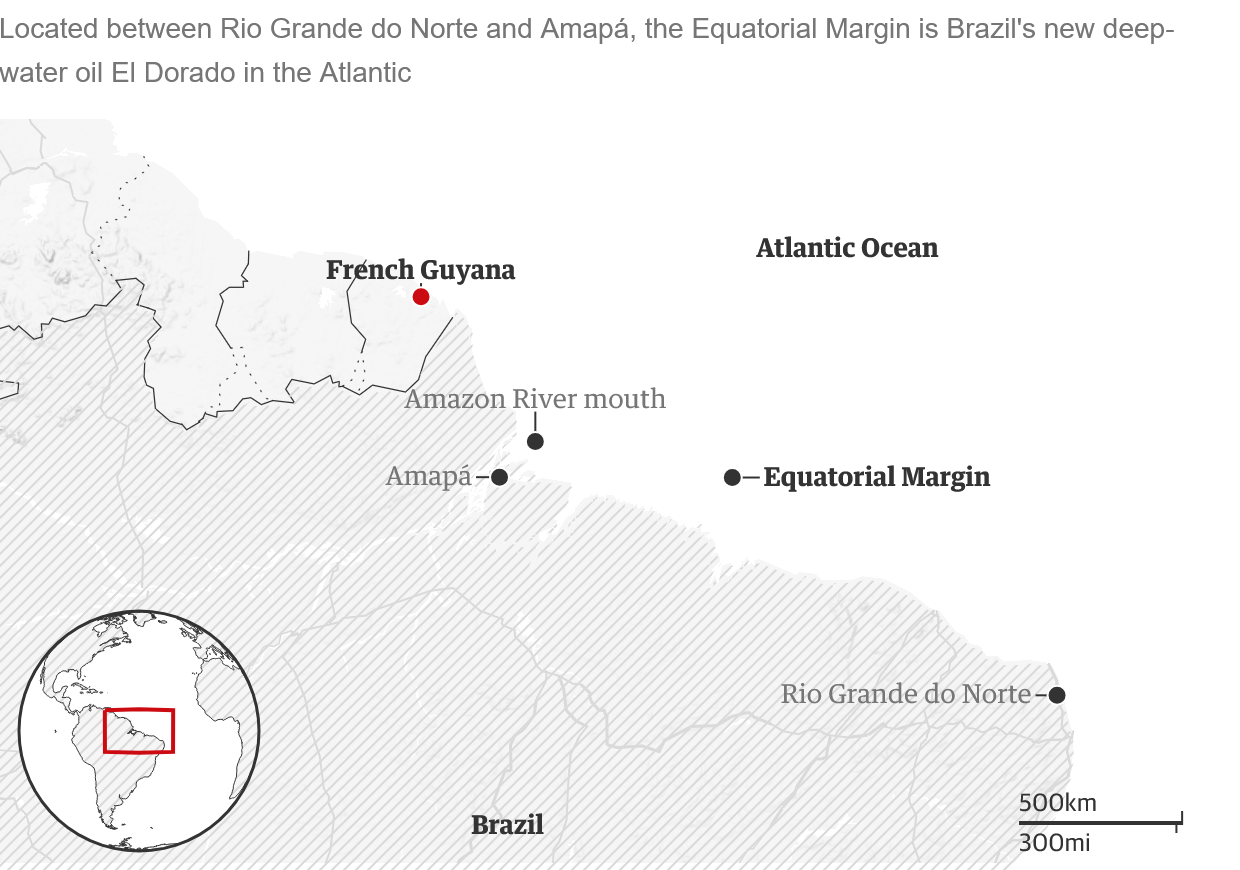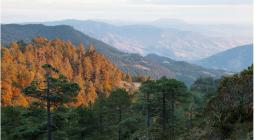Pristine forests and grinding poverty: why shouldn’t Brazil’s Amapá state embrace oil wealth?

Illustration: Israel Vargas
The Brazilian state of Amapá is a densely forested chunk of land slightly larger than England and geographically isolated from the rest of Brazil. It has one of the country’s lowest human development indices, and half its population lives in poverty.
“We have the best conservation figures in Brazil, perhaps the world,” said Clécio Luis, Amapá’s governor, last month. “But our people are poor.”
All that could change, he says, if Amapá was paid to preserve its forests. But having waited fruitlessly for such compensation, Luis proposes to bring prosperity by exploiting a different type of natural resource: fossil fuels. Potentially massive deposits lie deep off its coast, on the so-called Equatorial Margin, a new offshore frontier currently driving an oil boom in neighbouring Guyana.
Environmentalists fiercely oppose oil exploration in the ecologically sensitive Amazon basin, which is near protected reserves and Indigenous lands, home to a rare type of mangrove, and has a little-studied coral reef system. But politicians say oil would bring jobs and development to the region.
Why shouldn’t Amapá – and Brazil – make the most of its oil wealth? That’s a question repeated over and over as president Luiz Inácio Lula da Silva grapples with the dilemma of reconciling his environmental commitments with the lure of petrodollars.
Brazil is poised to become the world’s fifth-largest oil producer by 2030, buoyed by increased output from deepwater deposits in its southeastern coast.
The Latin oil rush

Yet Petrobras, the state-controlled oil and gas company, wants more. It has drilled exploratory wells in a new basin near the Amazon River’s mouth and is contesting environmental regulators’ refusal to grant an exploration licence in court.
In a time of climate crisis, oil has become a key element of Brazil’s development strategy, placing the country as the leader of an oil rush that is under way in Latin America and the Caribbean.
“We’re not going to throw away any opportunity for this country to grow,” Lula recently told an audience of global leaders and investors about the Equatorial Margin, the offshore area spanning 2,000km off the northern coast.
“There is an internal contradiction within Lula himself, in that he is committed to environmental issues when it comes to Amazon deforestation, to protecting Indigenous land … [but] Lula has a historical relationship with oil, which he sees as wealth and progress,” says political scientist Sérgio Abranches.
It was during Lula’s first stint in office that Petrobras discovered the pre-salt oil region: huge deepwater deposits off Brazil’s south-eastern coast, so called because they lie beneath a thick layer of salt kilometres under the sea. According to successive governments, these oilfields helped fund education, health and welfare spending – as well as generating record profits for Petrobras shareholders.
Although Petrobras later became embroiled in corruption scandals, it remains for many a symbol of national pride. Crude oil has become Brazil’s second largest export, behind soya. Last year, the country produced a record 3.4m barrels daily.
Politicians in Brasília and oil executives in Rio are now considering the Equatorial Margin as a new frontier that would cement Brazil’s position as a leading oil producer even after output from the pre-salt region peaks at the end of the decade.
Petrobras is betting big on the area. The state-controlled company holds the exploration rights to 16 blocks in the Equatorial Margin and plans to invest more than 40% of its $7.5bn five-year exploration budget there. It began exploratory drilling – and found oil – in the southernmost basin earlier this year. However, permission is still pending to drill off the coast of Amapá near the mouth of the Amazon River, in the most coveted northern basin.
Last year, Ibama, the federal environmental regulator, denied Petrobras a licence to drill in the FZA-M-59 block. The decision sparked criticism from oil proponents, including energy minister Alexandre Silveira. Still, it was celebrated by environmentalists and local communities worried about possible oil spills, the increase in the presence of large vessels and an influx of people looking for work affecting their traditional way of life. Indigenous people say they have not been properly consulted.
Petrobras has appealed Ibama’s decision and is pushing for a favourable second verdict to allow it to start exploratory drilling in the FZA-M-59 block before the end of the year. But a strike by Ibama workers has slowed down licensing processes. At the same time, a member of the environment ministry recently suggested that a resolution might in any case not be reached before next year’s Cop30 UN climate conference, which Brazil will host in Belém. This city is a gateway to the Amazon rainforest and this new oil frontier.
Last year, countries at the Cop28 climate conference reached a landmark agreement on transitioning away from fossil fuels – just days after Brazil announced it was joining the OPEC+ oil cartel as an observer country.
The internationally respected environment minister, Marina Silva, has defended the need for Petrobras to become an energy, rather than oil and gas, company and even spoken of capping oil production. Her counterpart in the energy ministry says oil wealth will fund the energy transition.
Lula wants Brazil to be a leader in the energy transition, yet he is pushing for more investment in refineries. His government is also holding massive tenders to sell off oil exploration rights, including in sensitive areas within the Amazon forest.
João Marques, a researcher at the Fundação Getulio Vargas University and thinktank Centre for Energy Studies, says it is about pragmatically exploiting the different available resources. “It’s not a contradiction; it’s a complementarity. Brazil is making efforts both on renewable energy and on fossil fuels,” he says.
Petrobras has increased its investments in renewables, but the $11.5bn it has earmarked for decarbonisation and low-carbon energies over the next five years pales in comparison to the $73bn for oil exploration and production.
In a statement to the Guardian, the company said that new oil frontiers like the Equatorial Margin “will guarantee national energy self-sufficiency, security and sovereignty [and] drive the country’s sustainable development and fair energy transition”.
The government’s intention to continue betting on oil and gas is evident in Lula’s appointment of Magda Chambriard as the new CEO of Petrobras: an engineer specialising in the oil industry who was allegedly chosen to fast-track exploration and infrastructure projects for oil and gas. “We know how to make oil,” she told reporters last month. “It is essential that we continue to replace reserves, particularly on the Brazilian coast.”
As the exploitation of the equatorial margin looms, NGOs such as Greenpeace rally against Petrobras’s project. “It makes no sense. We don’t need these new reserves,” says Ricardo Fujii, energy transition lead at WWF-Brasil. “It was one thing to be concerned with replacing oil and gas reserves in the 1990s, in the 2000s. It’s another thing today when we have a much better understanding of the impact of climate change.”
A study showed that the link between the climate crisis and oil and gas was brought into stark focus by the recent extreme floods in Rio Grande do Sul. These floods were made twice as likely by the burning of fossil fuels and trees.
The ministry for mines and energy nonetheless told the Guardian that “the country needs to understand that the path to net zero goes through a reduction in the burning of fossil fuels, not a reduction in the production of oil and gas.”
“The government’s project is exportation,” says Suely Araújo, public policy coordinator at the Climate Observatory group and former head of Ibama. “But even if those greenhouse gases don’t add to our national emissions, that exported oil will burn somewhere and aggravate the climate crisis.” .
Brazil is far from the only nation trying to balance environmental commitments with pro-oil political pressure – but it is in a fairly unique position in that its energy sector accounts for less than 20% of total CO2 emissions. Nearly half of its energy matrix and 88% of its electricity are powered by renewable sources, mainly hydropower.
That fact is often held up as a licence for the country to keep pumping oil while it calls on rich nations to step up their efforts and funding for the energy transition.
Environmental analysts say that his head start will not benefit Brazil long if it neglects investment in clean energy to benefit the fossil fuel industry.
“You cannot defend decarbonisation while wanting to increase oil production significantly. You cannot be both an environmental power and an oil power,” says Araújo. “That’s incompatible.”





